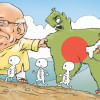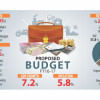Inflation target set at 5.8pc
Finance Minister AMA Muhith yesterday set the inflation target at 5.8 percent for the upcoming fiscal year against the backdrop of a stable local market resulting from a drop in international commodity prices.
If achieved, this would be the lowest average inflation in a decade.
According to the Bangladesh Bureau of Statistics, the annualised average inflation in the outgoing fiscal year is 6 percent, based on the data available up to April and so it would likely remain within the target of 6.2 percent by the year end in June, Muhith said.
The overall inflation declined 4 basis points to 5.61 percent in April from the previous month amid lower rice and vegetable prices at home and the slump in commodity prices in the international market.
Food inflation dropped 5 basis points to 3.84 percent and non-food inflation 2 basis points to 8.34 percent in April, mainly due to satisfactory yields of agricultural products, reduction of commodity prices, and prudent macroeconomic management.
The inflation goal is in line with what suggested by economists and development partners.
In the latest report on Bangladesh, the World Bank said Bangladesh Bank could be a bit more ambitious in lowering the inflation target below 6 percent.
The non-food inflation that has perpetually remained above 8 percent is high, said the Washington-based lender.
The persisting high inflation in an environment characterised by declining commodity prices reflects the influence of supply-side bottlenecks and a lack of pass-through of international prices to the domestic market, according to the WB report.
Though the government has recently reduced the prices of various petroleum products, the price of diesel, a big contributor to inflation, saw a token cut. If the diesel price is not lowered substantially, it will not have much impact on non-food inflation, according to observers.
However, both the WB and the International Monetary Fund recently said inflation is expected to edge up from fiscal 2016 to fiscal 2018 on account of higher public sector wages and a one-off effect of the introduction of the new VAT law.
High inflation hits the poorest the hardest, particularly those having fixed incomes.
Earlier this week, AB Mirza Azizul Islam, a former finance adviser, told The Daily Star that the government is forcing people to buy goods and services at higher prices through imposing regulatory and supplementary duties, adding that the structured import duties should be reexamined.

 For all latest news, follow The Daily Star's Google News channel.
For all latest news, follow The Daily Star's Google News channel. 








Comments